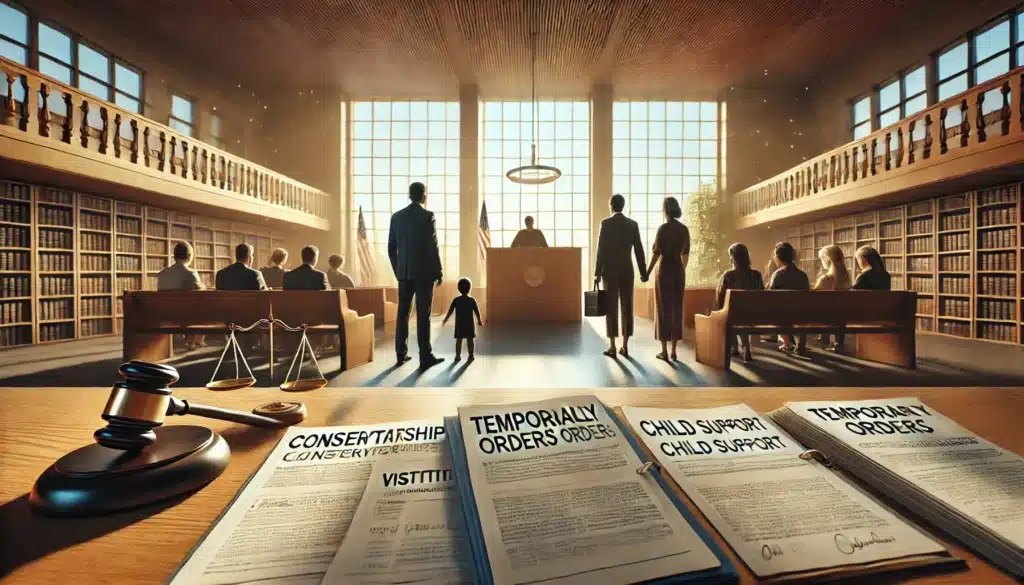Imagine you’re at the park with your child, and everything seems fine—until you realize that your current custody arrangement just isn’t working. Maybe there’s a serious issue, and you know your child needs protection now. Filing for temporary custody in Texas can feel like a whirlwind of paperwork and court dates, but don’t panic. You’re not alone in this, and we’re here to walk you through every step.
Short answer: Filing for temporary custody in Texas is crucial if your child’s safety is at risk, and yes, it can make a world of difference in urgent situations. The good news? It doesn’t have to be as intimidating as it sounds.
So, why should you keep reading? Because whether you’re dealing with a messy custody dispute or worrying about your child’s well-being, we’re diving into everything you need to know about temporary custody—from the process itself to key legal strategies and real-life examples. Stick around, and we’ll break down complex legal jargon into something you can actually understand!
Key Takeaways
- Temporary custody in Texas is established to prioritize the child’s well-being during legal disputes, ensuring stability in living arrangements and parental responsibilities until a final court decision is reached.
- Filing for temporary custody requires a petition detailing the child’s immediate danger and supporting evidence, followed by a hearing where both parties present their cases for judicial evaluation.
- Texas courts grant temporary custody based on the child’s best interests, considering safety, stability, and emotional well-being while outlining orders for conservatorship, visitation, and child support.
Understanding Temporary Custody
When dealing with custody battles, Filing for temporary custody in Texas is essential to safeguard a child’s well-being during a time of uncertainty. Under Texas law, temporary custody orders are put in place to provide immediate, provisional agreements on child custody, support, and visitation while awaiting a final decision from the court. These orders, as outlined in Texas Family Code § 105.001, ensure that a child’s living arrangements and parental responsibilities are clearly defined and maintained throughout the legal proceedings, offering much-needed stability.
Understanding Temporary Orders in Texas Divorce Cases involves recognizing that these temporary orders can last up to 14 days or until a formal hearing is conducted. This interim period is vital for establishing a secure environment for the child, ensuring continuity and reducing emotional stress during a tumultuous time.
Navigating the legal process of Filing for temporary custody in Texas becomes more manageable when parents understand the critical role of these temporary orders. By focusing on the child’s best interests and maintaining stability, parents can make informed decisions that positively impact the child’s future.

Circumstances Requiring Temporary Custody
Temporary custody orders become crucial when there is potential abuse, neglect, substance abuse, or the risk of abduction by a parent. In such situations, swift legal action is required to ensure the child’s safety and well-being. Filing for temporary custody in Texas often involves requesting temporary restraining orders to prevent a parent from making significant changes to the child’s environment, such as relocating out of state. Under Texas Family Code § 105.001, these orders protect the child’s interests while a final decision is pending.
Texas Divorce Temporary Orders: What You Need to Know highlights that Filing for temporary custody in Texas typically occurs during divorce or custody disputes. When a parent needs to establish a temporary custody arrangement before the final court order, the process involves submitting a petition along with supporting affidavits detailing the reasons for seeking temporary custody. Providing the court with relevant forms and evidence is essential to offer a comprehensive understanding of the circumstances.
Having experienced family law attorneys is invaluable when navigating these complexities. Their guidance ensures accurate preparation and submission of the required documentation, significantly increasing the chances of a favorable outcome. With the right legal support, parents can secure the necessary protection and stability for their child during the legal proceedings.

Steps to File for Temporary Custody in Texas
Filing for temporary custody in Texas requires several critical steps, beginning with the submission of a petition to the court. This process includes completing specific forms and gathering supporting documentation that outlines the reasons for seeking temporary custody. According to Texas Family Code § 105.001, the petitioner must also prepare and submit a detailed affidavit that demonstrates the child’s immediate danger, supported by specific incidents and corroborating evidence.
Once the petition is filed, the court will schedule a temporary orders hearing. During the hearing, both parties have the opportunity to present their case, including any relevant evidence or testimony. The judge will then carefully review the evidence and issue a temporary order. This order remains in effect until a final custody determination is made, ensuring the child’s well-being and stability throughout the legal proceedings.
For a more detailed understanding, How Do Texas Temporary Orders Work: A Practical Guide explains that temporary orders serve as a vital tool in safeguarding a child’s best interests during contentious custody disputes. Whether addressing conservatorship, visitation, or child support, these orders provide immediate protection and structure until a final decision is reached.

Submitting a Petition
Submitting a petition to the court is the initial step in filing for temporary custody. This includes preparing a detailed affidavit outlining the immediate danger faced by the child, supported by specific incidents and corroborating evidence. Effective legal counsel can aid in navigating the procedural requirements of filing motions and preparing for temporary custody hearings.
Filing a petition includes gathering necessary documentation like police reports, medical records, and witness statements. These documents provide a comprehensive picture of the situation and support the request for temporary custody. A well-prepared petition can significantly impact the case’s outcome and ensure the child’s protection during legal proceedings.
Temporary Orders Hearing
At a temporary orders hearing, both parties present their case through testimonies and documentation. This step is critical as the judge evaluates evidence to determine suitable temporary arrangements for the child. Witness testimonies offer valuable insights into the child’s situation and support the petitioner’s claims.
The judge considers all presented evidence, including documentation and witness statements, to make an informed decision about the temporary custody arrangement. This prioritizes the child’s best interests and ensures a temporary order is issued based on accurate and comprehensive information.
Obtaining a Temporary Order
After reviewing the evidence and testimonies, the judge issues a temporary order reflecting the child’s best interests. This provisional custody arrangement remains until a final decision is made, ensuring that the child’s living arrangements, visitation, and parental responsibilities are clearly defined and maintained throughout the legal proceedings.
The temporary order stays in effect until a final custody determination is made, providing stability and continuity for the child during the legal process and ensuring their safety and well-being are maintained.
Factors Considered by Texas Courts
When Filing for temporary custody in Texas, the courts prioritize the child’s best interests above all else. The primary focus is on the child’s safety, emotional well-being, and the need for stability and continuity during a potentially turbulent time. Under Texas Family Code § 153.002, the court evaluates both parental rights and responsibilities, ensuring that the temporary custody arrangement serves the child’s immediate needs.
In What To Expect In A Temporary Orders Hearing In Texas, it’s important to understand that the stability of the child’s environment plays a critical role in the court’s decision. During the initial custody hearing, the judge will carefully assess whether the proposed temporary arrangement promotes the child’s best interests, ensuring they have a stable and supportive environment. Factors such as the child’s living situation, emotional support, and the continuity of care are all carefully considered in these decisions. This ensures that the temporary order provides the necessary structure until a final custody determination is made.

Types of Temporary Orders
How to Use Temporary Orders and Temporary Restraining Orders in Texas custody cases is essential for providing immediate stability and addressing the child’s needs throughout the legal process. Under Texas Family Code § 105.001, temporary orders can include conservatorship, visitation schedules, and child support arrangements. These temporary orders ensure that a child’s living situation and care are clearly defined and maintained while awaiting a final custody determination.
Temporary restraining orders, on the other hand, are used to protect the child and prevent any parent from making significant changes that could disrupt the child’s life, such as moving the child out of state or altering their environment. Together, these legal tools provide a structured framework that supports the child’s best interests during contentious custody disputes. Consulting with an experienced attorney can help ensure these orders are applied effectively to safeguard your child’s well-being.
Temporary Conservatorship
Temporary conservatorship designates one or both parents with short-term decision-making authority regarding the child’s welfare. This arrangement affects parental rights by temporarily assigning decision-making authority to meet the child’s needs.
Visitation Schedules
Visitation schedules in temporary custody arrangements are typically determined based on the child’s best interests and the parents’ availability. These schedules outline how parenting time is divided, ensuring stability for the child and maintaining relationships with both parents.
Child Support
Temporary child support orders ensure financial assistance for the child’s needs during the custody dispute process. Based on the parents’ income and the child’s needs, these orders provide immediate financial support during ongoing legal proceedings.
Texas courts establish temporary child support orders during custody disputes to meet the child’s financial needs while the case is ongoing. This arrangement helps maintain the child’s well-being and stability, ensuring their needs are adequately addressed during the legal process.

Preparing for a Temporary Custody Case
Preparing for a temporary custody case involves gathering thorough evidence, such as police reports, medical documents, and witness statements. This evidence demonstrates the need for immediate custody and protects the child’s safety. Including formal documents, witness statements, and photographs can significantly strengthen your custody case.
Working with an experienced family law attorney is crucial for navigating the legal process and ensuring accurate preparation and submission of all necessary documentation. Understanding the timeline for court proceedings and being well-prepared can greatly impact the custody case’s outcome.
Modifying Temporary Custody Orders
To modify a temporary custody order, follow these steps:
- File a Petition to Modify in the county where the existing order was issued.
- Pay the filing fee (note that a fee waiver can be requested if financial constraints exist).
- Gather affidavits from witnesses, including teachers and counselors, to support the request for modification.
Judges typically require a compelling reason to modify a temporary custody order, such as endangerment of the child by the current custodial parent. Providing substantial evidence and a clear rationale for the modification request can enhance the chances of a favorable outcome.
Emergency Situations and Temporary Custody
Emergency custody orders are granted when clear evidence of imminent danger to the child is presented. Immediate danger to a child’s well-being can justify the request for emergency custody, necessitating swift legal action. Substantial evidence of immediate danger, such as abuse or neglect, must be presented in a sworn affidavit to obtain an emergency custody order.
Judges carefully assess claims for emergency custody orders, weighing evidence to ensure the child’s best interests are served. Legal representation is crucial during these proceedings to present compelling evidence and advocate for the child’s safety. Temporary restraining orders can be requested alongside emergency custody motions to protect the child from immediate threats.
Legal Representation and Guidance
West University Houston Temporary Orders Attorney representation is crucial during temporary custody cases to ensure that your rights and interests are effectively protected. According to Texas Family Code § 105.001, an experienced family law attorney can make a significant difference by enhancing the presentation of evidence during custody hearings and improving your chances of a favorable outcome. They provide expert guidance throughout the process, ensuring all necessary documentation is properly submitted and organized.
Consulting with a West University Houston Temporary Orders Attorney offers the benefit of personalized legal strategies that are tailored to your specific situation in custody disputes. Navigating the complexities of custody cases requires skilled legal counsel, and having an attorney by your side can greatly improve your chances of securing the best possible outcome for your child’s future.
Conclusion:
So, here we are. You’ve learned the ins and outs of filing for temporary custody in Texas, and while it might have seemed overwhelming at first, you now know it’s a crucial step to protect your child when time is of the essence.
Taking action is never easy, especially when it comes to something as emotional as custody, but you’ve armed yourself with the knowledge and tools to navigate the process. From understanding what’s involved in filing the petition to preparing for court hearings, you’re ready to tackle the challenges ahead.
Remember, you don’t have to do this alone. Legal experts can guide you through the complexities and ensure that your child’s best interests are always front and center. The road may be tough, but you’ve taken the first step toward ensuring your child’s safety and stability.
Now that you’ve got the essentials down, it’s time to move forward confidently. You’ve got this!
FAQ – Filing for Temporary Custody in Texas
To file for temporary custody in Texas, you must submit a petition to the court, providing evidence that shows the immediate need for a temporary custody arrangement. This includes preparing affidavits, gathering supporting documentation, and attending a temporary order hearing.
A temporary custody order in Texas typically lasts until the court makes a final custody decision or until a further court order modifies it. This could be anywhere from a few weeks to several months.
Temporary guardianship in Texas can last for up to 60 days, unless extended by the court for good cause. After that, a more permanent arrangement may need to be established.
To enforce a temporary order in Texas, you can file a motion for enforcement with the court. If the other party is not complying with the order, this can lead to penalties, including fines or even jail time.
You can file for custody in Texas without a lawyer by completing the necessary forms, submitting a petition to the court, and representing yourself at the hearings. However, it’s crucial to understand court procedures and requirements to avoid mistakes.
In Texas, obtaining guardianship without going to court is not typically possible. Guardianship involves legal proceedings to ensure the child’s best interests, and this requires a court order.
To prepare for a temporary order hearing in Texas, gather all relevant documentation, such as affidavits, police reports, and witness statements. Be ready to present evidence supporting your request for temporary custody, and consult with your attorney to ensure you’re fully prepared.
Abandonment in Texas is typically defined as a parent’s failure to provide adequate support, care, or communication with the child for at least six months. This can be grounds for termination of parental rights.

